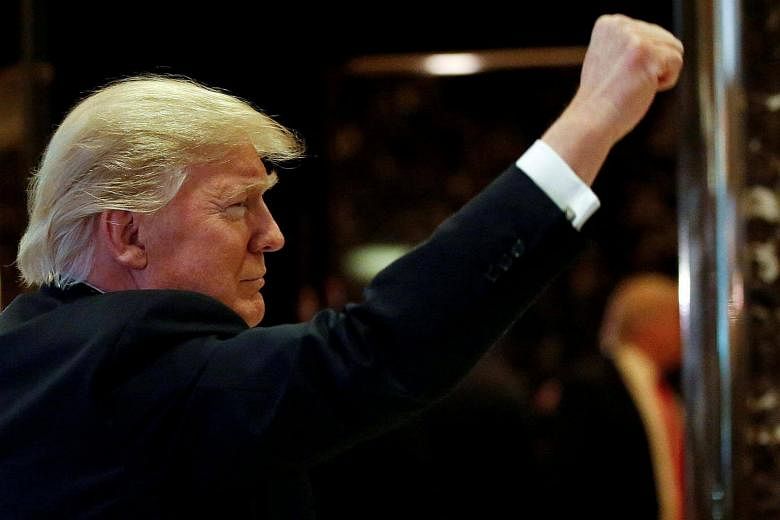SACRAMENTO/LONDON (Bloomberg) - China's foreign ministry said its One-China policy isn't negotiable and urged Donald Trump to recognise the "high sensitivity" with which it views Taiwan, a day after the president-elect hinted for the second time in a month at a reset of US-China relations.
Trump was quoted by the Wall Street Journal late Friday as saying he would only commit to the One China policy after assessing the progress the world's second-largest economy makes on trade and currency issues.
"The One-China principle, which is the political foundation of the China-U.S. relations, is non-negotiable," Ministry of Foreign Affairs spokesman Lu Kang said in a statement on the agency's website.
One China is an acknowledgment that Taiwan and China are part of the same China, even if they disagree on what that means. Beijing regards it as a bedrock policy, not the bargaining chip that Trump has suggested.
President Barack Obama has cautioned his successor against lightly abandoning Washington's stance on the delicate topic.
"In order to avoid disruption to the sound and steady development of the China-US relations and bilateral cooperation in key areas, we urge relevant parties in the US to fully recognize the high sensitivity of the Taiwan question, approach Taiwan-related issues with prudence, and honour the commitment made by all previous US administrations of both parties on adhering to the one-China policy," Kang said in the statement.
Currency Action
The President-elect told the Wall Street Journal he isn't prepared to declare China a currency manipulator immediately upon being sworn in on Jan 20.
Trump threatened during his campaign to brand China a currency manipulator immediately upon taking office, and to slap 45 percent tariffs on its exports to the US.
"I would talk to them first," Trump was quoted as saying. "Certainly they are manipulators. But I'm not looking to do that."
Trump has questioned the US's longstanding policy of recognising Beijing over the government in Taiwan, and criticised China for a perceived failure to further pressure North Korea over its nuclear programme.
The President-elect caused concern in Beijing after a 10-minute phone call in early December with Taiwan's President Tsai Ing-wen, the closest a Taiwanese leader has come to getting formal recognition from Washington since the US established ties with the Communist government in Beijing almost four decades ago.
Russian Sanctions
Trump also told the newspaper he would maintain sanctions imposed by the Obama administration against Russia in place "for a period of time," adding that he'd consider lifting them once Vladimir Putin proves he can be an ally.
"If you get along and if Russia is really helping us, why would anybody have sanctions if somebody's doing some really great things?" Trump was quoted as saying during an hour-long interview with the paper a week before he is sworn in as president.
At stake is whether Trump will take a conciliatory stance against Russia after Obama in December hit Russian intelligence officials and agencies with sanctions for cyberattacks aimed at interfering with the 2016 presidential campaign.
After 35 Russian operatives were expelled from the US, Russia's president said his government wouldn't retaliate because he was waiting for Trump to take office.
Trump responded with a tweet in which he called Putin "very smart."
At a news conference on Jan 11, Trump acknowledged for the first time that Russia was responsible for hacking the e-mail accounts of the Democratic National Committee and Hillary Clinton's campaign chairman.
He has nonetheless stressed that he hopes to have a better relationship with Moscow and that he thinks there has been too much attention paid to the issue.
Trump has signalled he's looking to shake up relationships with the two superpowers. He wants closer ties with Russia and says the U.S. can work with the Kremlin to combat Islamic terrorism, while vowing to get tough on China.
Trump's pick to lead a newly-formed White House National Trade Council, Peter Navarro, a University of California at Irvine economics professor, is a frequent critic of China's trade practices.

